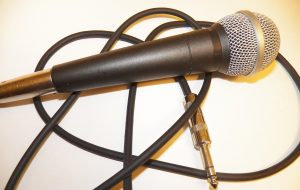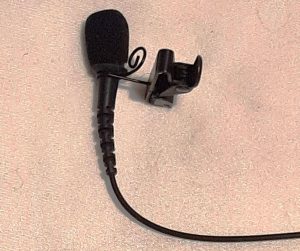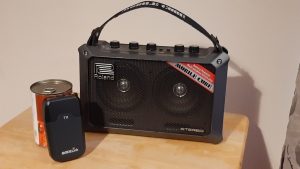For The Love Of Mic
I’ve been using microphones professionally in different contexts since my mid-twenties, and it’s safe to say that I love them. That love goes hand in hand with my passion of anything to do with voice – speaking and singing. I’ll write more about voice from time to time, but this one’s about the use of mics by celebrants. To mic or not to mic? That is the question!
If you’re officiating (or celebranting, as I like to think of it) in a crematorium, the answer to that question is taken out of your hands. There’ll be a mic in front of you whether you like it or not. I wonder why? You might be thinking ‘What a stupid question?’ Fair enough! But why do many celebrants choose not to be mic’d when they’re celebranting in places other than a crem?

One reason could be cost. A basic handheld mic, plus cable, and a decent small battery-powered amplifier could easily set you back £200 or so. (Battery powered for if you want to use it where there’s no mains electricity.)

If you have your script in one hand and your mic in the other, what happens when you want to do something that needs you to use a hand – say, lighting a candle? Even worse, how would you do a hand-tying? Having a mic stand could be useful (maybe another 30ish pounds).

But using a mic on a stand means you’d be static, which often isn’t ideal: and if you turn your head to one side to include some of the people there, your voice would go off mic.

The answer to that is to use a battery-powered radio mic. The transmitter would be hidden somewhere in your clothing, and the mic would be plugged into it – either the lapel type… which you’d ideally wear centrally, rather than to one side,

or a headset mic. Mind you, from a distance you might mistake this subtle headset for a lump on my face!

A half-decent radio mic may cost you between £150-£250. There are cheaper ones, but my experience is that their sound isn’t great. (There are also more expensive ones, and they’re so… expensive!)

So, it’s understandable if you baulk at that expense, especially if you’re in the early part of your celebrant career.
A reason commonly given by celebrants as to why they don’t use a mic is along the lines of ‘I have a big, powerful voice, so I can be heard by everyone present – either in a big hall or halfway up a hill’.

Congratulations! Well, I, too, have a big, powerful voice; and the chances are, after a lifetime of vocal training and knowing how to look after my voice, that mine’s bigger than yours! But I wouldn’t dream of working unamplified unless the conditions were such (either high winds or rain) that it wasn’t feasible to use a sound system.
What’s the big deal? It’s about being able to reflect intimacy and warmth in your voice as you speak to a group of people. The larger the gathering, and the more challenging the conditions, the harder you’d need to work to maintain your bond with the listeners. The more you have to project in order to be heard, the less warmth you can retain in your voice, and the less likely you’d be to have a good connection with the people you’re talking to.
You could hear it for yourself by experimenting with a mobile phone. While holding it about a foot (30cm) from your mouth, record yourself speaking in a warm, friendly voice for a few seconds to an imaginary person who’s about two yards (or metres) away. Then say the same words imagining that the person is five yards away. Then 10. Then 20, and so on. Try and keep the same warm, friendly feeling each time. You’ll hear and feel that it becomes more of a struggle the further you have to project. The warmth gradually disappears, and the louder you have to speak in order to be heard, the less variety you can get into how you’re sounding.

Another thing to think about indoors is the acoustics. Some large spaces have a lot of reverb/echo – which might sound great if you’re singing (a bit like in some bathrooms), but can make the spoken word unclear, especially if you’re not amplified. And outside, the sound doesn’t carry as well as inside because there aren’t walls to contain it – which puts more pressure on the voice. If you use a decent mic-and-speaker system, keeping the all-important warmth in your voice is much easier.

When speaking amplified in a ceremony, ideally there’d be a small amount of projection. This is because there needs to be some energy in a celebrant’s connection with the people present. That energy can come from a desire to share whatever they’re saying. If that energy isn’t there, the speaking will sound flat. Another interesting aspect about energy levels and projection while amplified is that if there’s a large audience, stretching a long way back, either indoors or outdoors, there’s a natural tendency to project more. As long as the celebrant doesn’t lose the warmth in their voice, that’s alright. And of course, they can increase the volume of the amplifier – taking care not to cause unwelcome feedback (the squeaky noise that happens when the gain on the mic and the volume of the amplifier are too high).
The pros of being amplified are:
A warmer, friendlier sound
More natural-sounding variety in your voice
It’s easier to be relaxed
There’s less pressure to be heard
Less voice strain
Breath control is easier
Your voice can stay fresher longer
The cons:
The expense
The hassle of venturing into uncharted technical matters
Extra gear to carry with you
It’s something else to have to think about unless you have help
I offer a free no-obligation chat (phone or
Zoom) so you can see whether you’d benefit from working with me. Often, the
answer is yes. I work on a session-by-session basis. Some people book just one,
and take it from there. Others commit to between two and four sessions. I
charge £70 for a one-hour session. (And as someone remarks in the testimonials, I’m generous with my
time.) I send an email after each session with a summary of what we worked on.
When you get to four sessions, you get a fifth one, free of charge.
This blog tells you why I’m highly qualified to be a celebrant voice,
presentation and communication coach. https://paulrobinsonvoicecoaching.co.uk/my-background-and-celebrant-training/
Website: https://paulrobinsonvoicecoaching.co.uk/
07469 957 199
For full one-on-one celebrant training, see Heart-led Celebrants – Heart-led
Celebrants (heartledcelebrants.com)